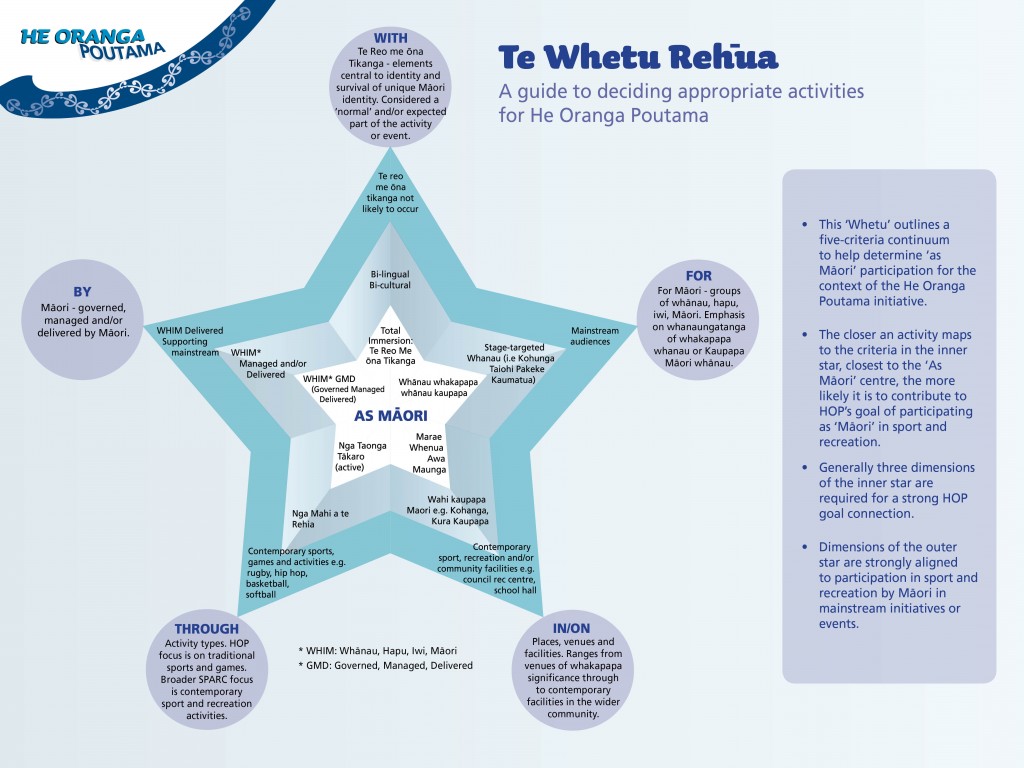Te Whetu Rēhua: a framework for defining as Māori participation in sport and recreation
Te Whetu Rēhua is a culturally based programme and evaluation framework developed for He Oranga Poutama. Te Whetu Rēhua encapsulates a collective and shared understanding of five key Māori concepts and principles that make up what it means to participate as Māori in sport and recreation in the HOP programme context.

Once developed, Te Whetu Rēhua became the foundation on which the programme’s management, delivery, monitoring and evaluation were based. It was used by Sport NZ to guide and clarify the types of activities that providers might deliver that most closely mapped to the programme goals. It was used by providers, particularly Regional Sports Trusts, to set clear boundaries about where their efforts should/needed to be focused to meet He Oranga programme goals and outcomes. The collaborative development process supported use of the monitoring and data collection tools, participation in the evaluative capacity building activities and engagement in the evaluation.
The table below provides a brief description of the five key concepts and principles of the Te Whetu Rēhua.
|
Dimension |
Description |
|
WITH Te Reo Māori me ōna Tikanga (Māori language and custom). |
Māori language and culture are central to the survival and expression of unique Māori identity. The centrality of Te Reo Māori me ōna Tikanga was consistently expressed by all participants as fundamental to the revitalisation of and reproduction of what it means to live as Māori in the contemporary world. |
|
BY – Governed, Managed and Delivered by Māori. |
This element refers to the degree that activities are governed, managed and/or delivered by Māori at organisational level. This element supports the principles of rangatiratanga, eg, it reflects the strong desire by Māori to be self-determining, having meaningful control of their lives and cultural wellbeing (Pihama, Cram, & Walker, 2002). |
|
FOR Whānau – The concept of whānau is highly valued in te ao Māori. |
Participating as Māori in modern times links to both traditional whakapapa (genealogical) whānau (whānau, hapū, iwi, waka) and more recent Kaupapa Māori whānau collectives (eg. kohanga reo, Aotea Māori netball). The principle of whanaungatanga is affirmed through this element. |
|
THROUGH – Doing activities/sports/games that have whakapapa to Māori origins (e.g., ki-o-rahi, mau rakau etc). |
HOP places an emphasis on the revitalisation of traditional sports and games, however it is also inclusive of contemporary sport and recreation activities.
|
|
IN/ON places with culturally significant histories or connection to Māori (e.g. awa, maunga, marae, whenua). |
Places and/or venues of whakapapa significance are associated with as Māori participation for culturally centred reasons. They provide access to possibilities of enhancing cultural identity.
|
Dimension Description
WITH Te Reo Māori me ōna Tikanga (Māori language and custom). Māori language and culture are central to the survival and expression of unique Māori identity. The centrality of Te Reo Māori me ōna Tikanga was consistently expressed by all participants as fundamental to the revitalisation of and reproduction of what it means to live as Māori in the contemporary world.
BY – Governed, Managed and Delivered by Māori. This element refers to the degree that activities are governed, managed and/or delivered by Māori at organisational level. This element supports the principles of rangatiratanga, eg, it reflects the strong desire by Māori to be self-determining, having meaningful control of their lives and cultural wellbeing (Pihama, Cram, & Walker, 2002).
FOR Whānau – The concept of whānau is highly valued in te ao Māori. Participating as Māori in modern times links to both traditional whakapapa (genealogical) whānau (whānau, hapū, iwi, waka) and more recent Kaupapa Māori whānau collectives (eg. kohanga reo, Aotea Māori netball). The principle of whanaungatanga is affirmed through this element.
THROUGH – Doing activities/sports/games that have whakapapa to Māori origins (e.g., ki-o-rahi, mau rakau etc). HOP places an emphasis on the revitalisation of traditional sports and games, however it is also inclusive of contemporary sport and recreation activities.
IN/ON places with culturally significant histories or connection to Māori (e.g. awa, maunga, marae, whenua). Places and/or venues of whakapapa significance are associated with as Māori participation for culturally centred reasons. They provide access to possibilities of enhancing cultural identity.
1. The value of Te Whetu Rēhua … Read more in He Oranga Poutama: What have we learned a report on the Developmental Evaluation of He Oranga Poutama.
